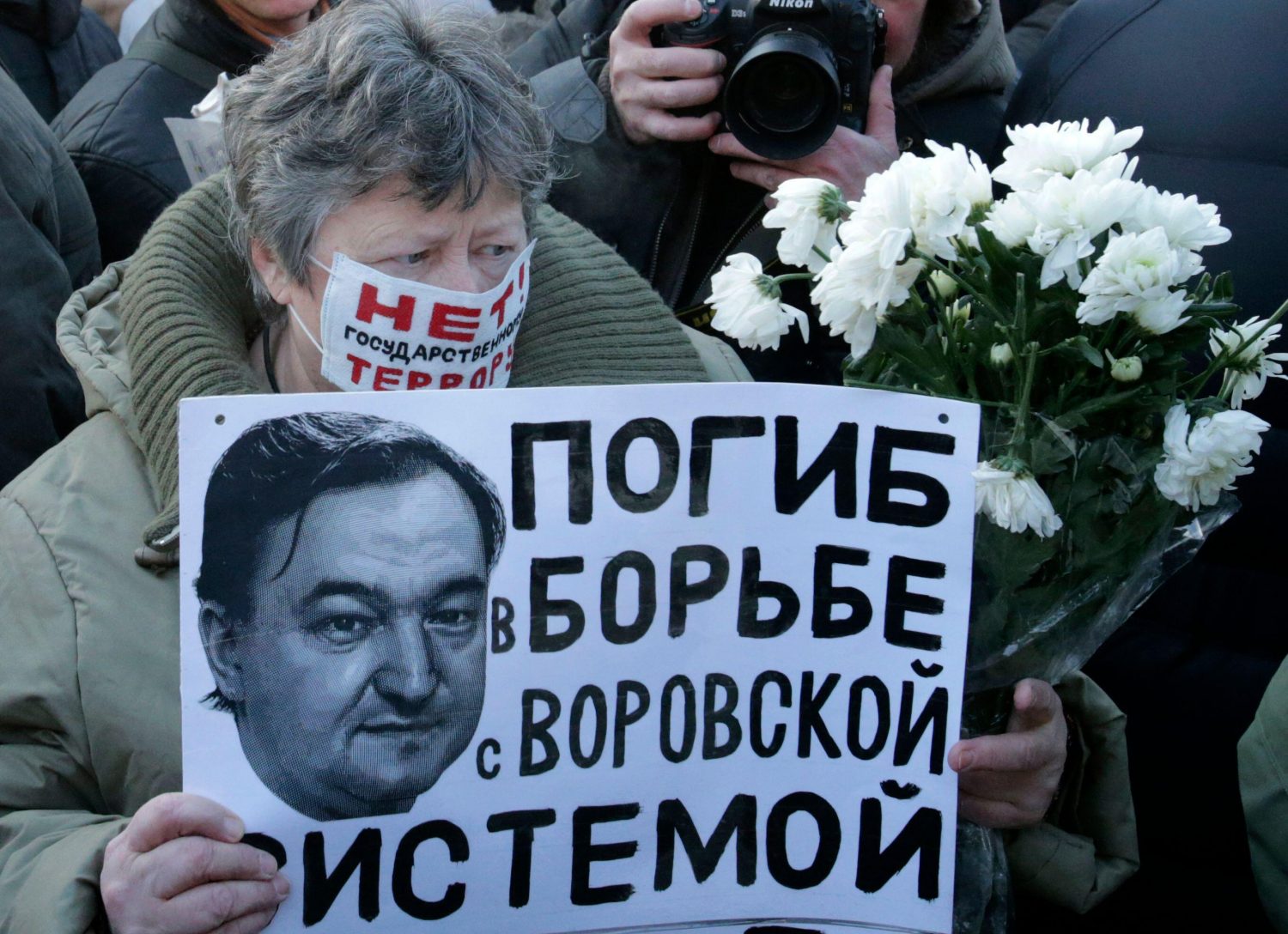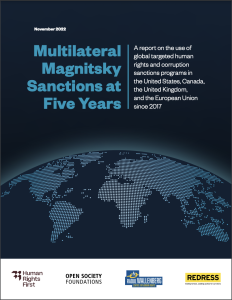
New Report Details Gaps in Multilateral Use of Magnitsky Sanctions
Facing significant gaps in the use of Magnitsky sanctions by the U.S., Canada, UK, and EU, leading human rights organisations have issued today the first-ever multilateral report calling for the more effective use of these human rights and anti-corruption accountability tools.
Michael Breen, President and CEO of Human Rights First, said:
“This report shows how much more the U.S. and other governments can do, both individually and together, to hold human rights abusers and corrupt actors accountable. Governments have made important use of Magnitsky-style sanctions in certain cases, but they need to take bolder and more coordinated action to ensure their sanctions reflect the urgent recommendations of civil society.”
The report, Multilateral Magnitsky Sanctions at Five Years, authored by Human Rights First, Open Society Foundations, Raoul Wallenberg Centre for Human Rights, and REDRESS, details many of the current gaps in the implementation of these sanctions programs, which can undermine their impact and effectiveness.
Rupert Skilbeck, Director at REDRESS, said:
“Targeted sanctions can play an important role in providing a measure of justice for victims of torture and other human rights violations. The key to effective sanctions regimes is for countries to work together, share information, and consistently impose co-ordinated sanctions. This report highlights where countries, including the UK, sometimes fall short in this coordination and where they can improve their use of Magnitsky Sanctions to provide accountability for human rights violations and corruption around the world.”
The report recommends that all four of the jurisdictions do more to “multilateralise” their Magnitsky sanctions and target a diverse array of abuses across more regions.
Tika Tsertsvadze, Senior Policy Analyst from Open Society (Europe and Central Asia), said:
“As a matter of urgency, the EU must adopt a targeted anti-corruption sanctions framework and coordinate with like-minded partners in corruption cases. This report also shows that the EU needs to step up efforts to use the Magnitsky-style legislation (Global HR sanctions) more flexibly and in situations where country-based remedies are not suitable and quick enough.”
The report release coincides with “Magnitsky Month”, a global effort advocating for the expanded and improved multilateral use of Magnitsky sanctions, which honours the legacy of Sergei Magnitsky, who was killed in a Russian prison in November 2009 after exposing corruption by government officials.
Irwin Cotler, International Chair of the Raoul Wallenberg Centre for Human Rights and Special Envoy of the Parliamentary Assembly of the Community of Democracies in the case and cause of Vladimir Kara Murza, said:
“The multilateralisation of Magnitsky Sanctions is as timely as it is necessary on this fifth anniversary and commemoration of Magnitsky Month. It will go a long way to secure justice for victims and accountability for human rights violators, while protecting the security of our democracies. It is particularly timely as Canada has just announced the imposition of targeted Magnitsky sanctions on the architects of repression in Russia, including on those involved in the arbitrary detention and unjust imprisonment of Russian democratic leader Vladimir Kara Murza, himself a champion of Magnitsky Sanctions.”
The report recommends the U.S., Canada, UK, and EU work to strengthen the use of their respective Magnitsky-style sanctions programs and better coordinate their responses to human rights abuses and corruption:
- Improve multilateral use of these sanctions tools. Only 11% of Magnitsky targets have been sanctioned by more than one jurisdiction under a Magnitsky program. While some of this gap is covered by other sanctions programs, all jurisdictions are missing opportunities to align their human rights and anti-corruption sanctions to ensure the greatest impact on perpetrators.
- Build on positive engagement with civil society: About one-third of U.S. Magnitsky-style sanctions have a basis in civil society recommendations, while the other jurisdictions appear less responsive, with estimates as low as 13% for the EU and 4% for the UK. All jurisdictions should strengthen their relationships with civil society and use civil society’s recommendations as bases for sanctions.
- Focus on underrepresented regions and holding allies accountable: Magnitsky sanctions should be used equitably in different geographic regions, focusing on a broad range of sanctionable acts in a variety of countries. In particular, sanctions against individuals from allied countries are rare; the U.S. has only sanctioned abuses in allied countries in five percent of cases, the UK in only two percent, and the others have not sanctioned abuses in any allied countries. Jurisdictions should sanction perpetrators of corruption or human rights abuses without fear or favour, in complement to other foreign policy efforts.
- Recognise a wider range of human rights abuses and marginalised victims: Jurisdictions have largely overlooked certain serious human rights abuses such as human trafficking, and should impose sanctions for a broader array of abuses. Similarly, jurisdictions rarely recognise certain marginalised victim groups – women, children, LGBTIQ+ persons, Indigenous persons, and persons with disabilities – but must do so.
- Strengthen corruption sanctions efforts: The U.S. has imposed the most Magnitsky-style sanctions for corruption – 84% of the total. Canada and the UK should be more proactive in using sanctions to address corrupt actors and networks, and the EU should adopt a global anti-corruption sanctions program.
The report’s authors coordinate a coalition of more than 330 civil society organisations around the world that advocates for accountability through the use of targeted human rights and anti-corruption sanctions.
The coalition helps civil society groups prepare well-documented recommendations to the U.S., Canada, UK, and EU identifying perpetrators eligible for human rights and corruption sanctions. Since 2017, the coalition has provided more than 150 sanctions recommendations and other forms of engagement and advocacy on sanctions targets to these jurisdictions.
In the five years since the first Magnitsky-style sanctions were introduced in 2017, the U.S., Canada, UK, and EU have used these programs to sanction more than 760 individuals and entities in 46 countries across five continents for human rights abuses and corruption.
For media inquiries, please contact:
UK: REDRESS, Eva Sanchis, Head of Communications, at [email protected] or +44 (0)20 7793 1777.
Washington: HRF, Meredith MacKenzie de Silva, at [email protected] or (202) 714-4129.
Canada: Raoul Wallenberg Centre for Human Rights, at [email protected].
EU: Open Society Foundations, Denise Sammon, Communications Officer, at [email protected] or +44 7796 1847 09.
Photo by Alamy Stock/REUTERS/Tatyana Makeyeva

